It's Android Camera Wars!
EK-GC100 versus S800c
| Samsung Galaxy Camera EK-GC100 |
Nikon COOLPIX S800c |
|---|---|
| 302 grams | 185 grams |
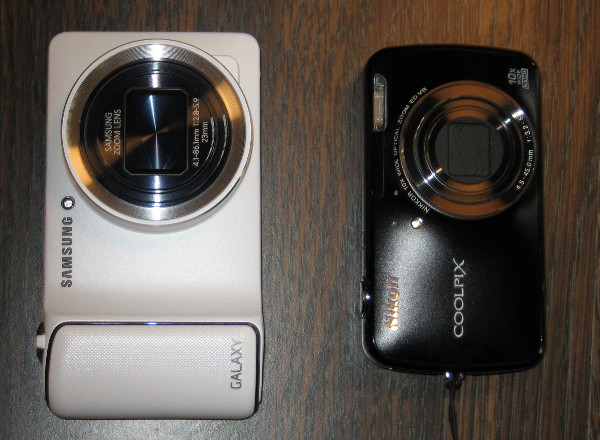
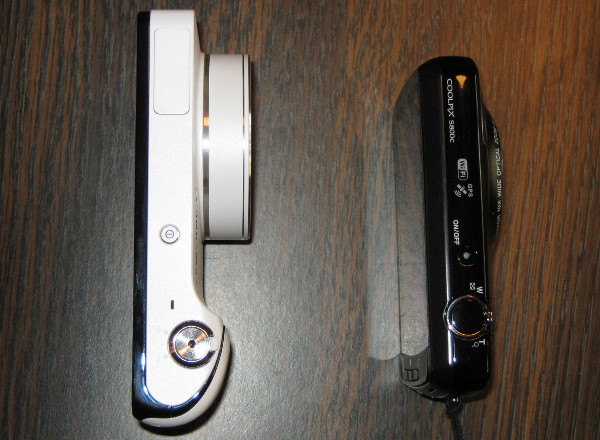
| Screen resolution | |
|---|---|
| 720x1280 | 480x854 |
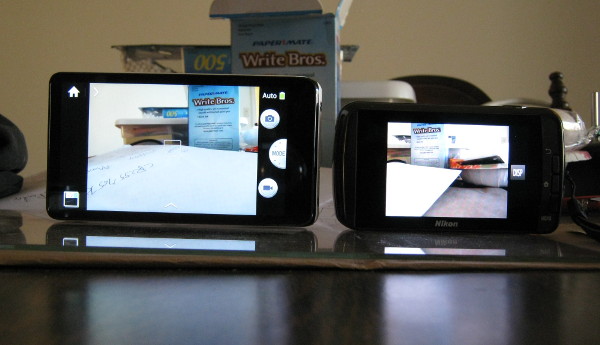
| Auto mode with flash image comparison: | |
|---|---|
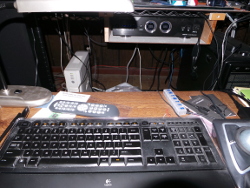 |
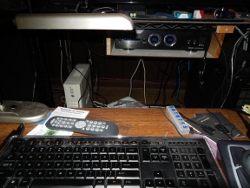 |
| Outdoors on sunny day: | |
 |
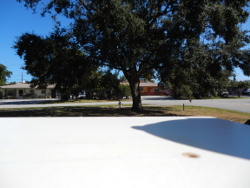 |
| Same with full zoom in to tree trunk: | |
 |
 |
| (Click on images to see original 16MP image) | |
| Now for the random babbling: | |
| See the Samsung Galaxy Camera product page. | See the Nikon COOLPIX S800c product page. |
The android Camera API
can access the 16 MP max resolution. |
The android Camera API
cannot access the 16 MP max resolution. Some undocumented
proprietary Nikon voodoo seems
to be involved with the Nikon camera app. |
| The Samsung Galaxy Camera is wayyy to big to be considered really portable. | The Nikon COOLPIX S800c is much closer in size to other point and shoot cameras and is easier to tote around. |
| The Samsung is much easier to actually hold in your hand with the shaped hand grip. | The Nikon is all rounded edges. Never try to use it without the wrist strap :-). |
| The Samsung Settings app has a Fast power-on checkbox under the power settings (on by default). It says it will provide for speedy start up for up to 24 hours without being charged. I don't know exactly what it does or how it is implemented, but certainly if you power off the camera, then later come back and hold down the power button, it vibrates once and then is almost immediately in the camera app ready to take pictures. I don't know if I could time it precisely, but it seems to be no more than 2 or 3 seconds. Not only are you in the camera app, but android itself is also up and running and you can exit the camera and get into the android launcher screen immediately. | The Nikon also has an equally quick instant on mode, but it apparently brings up the camera right away (no mention of 24 hour limit) and lets android boot in the background while the camera operates independently. (Though about 2% of the time, it seems to come up with the camera out of focus and you have to wait for android to boot to exit and restart the camera app). It only takes a few seconds for android to finish booting, but it is not nearly as quick as the camera comes up. |
| The Samsung connects to Wi-Fi very quickly, but even with the stay connected during sleep option turned on in advanced setting, it seems to often be disconnected when it comes out of standby (but not always - it is kind of random). | The Nikon often has problems connecting to Wi-Fi. It does pretty good most of the time unless you hide your SSID, it which case it can take many many tries to reconnect. It definitely takes longer to start the Wi-Fi connection than any other android device I have. |
| The Samsung camera seems to have android already unlocked (I think), at least when I held down the power button on startup, it told me about using the zoom control to access what sounded like recovery mode. When I get braver, perhaps I'll try to see if I can use that to install SuperSU and get the thing rooted. | The Nikon had to be rooted using gingerbreak. The handy gingerbreak apk didn't work, but following the original gingerbreak exploit instructions and running the app via adb did work. |
| The Samsung has a perfectly ordinary micro USB plug. | The Nikon has an annoying proprietary USB connector needing a special cable. |
| The Samsung is perfectly happy to be operated at the same time it is charging via the USB connection. The only really irritating thing is that the USB plug is smack in the middle of the hand grip, so you'll probably want it screwed into something like a tripod to operate in this mode (or you'll need to be careful how you hold it). | The Nikon needs a ridiculous adapter that pretends to be a battery to be operated on A/C power, and since the connector plugs in in place of the battery, you obviously can't charge at the same time, so you probably need an external charger if you want to save time by getting the battery charged while you are using the camera on A/C power. |
| The Samsung ($500) is wayyy more expensive than the Nikon, and you have to shop around to find an AT&T store that is willing to sell one without a data plan (which would make it astronomically more expensive still). | The Nikon came in at around $350 (still too expensive, but I wanted to develop on android cameras). |
| I don't use Windows for my android development, but I see Samsung has a windows USB driver available for download. On my Fedora 17 linux box, I plugged the Camera into USB after enabling USB debugging in developer options and it showed up immediately in the adb devices list. | There does not appear to be any
Windows USB driver for the Nikon, so android developers wanting
to use adb on windows are out of luck. On my Fedora 17 box I did
have to add the USB vendor ID to the
~/.android/adb_usb.ini file before it showed up in
adb, but it worked fine after that. |
| The Samsung video recorder seems to record H264 in a .mp4 file (by default anyway). Strangely the video editor app that comes preinstalled cannot seem to edit that format file :-). Anyway, fetching the video off the camera and editing it externally gives me this sample clip of a slow motion curly tailed lizard that happened to show up in my garage while I had the camera in my hand. | The Nikon records H264 but wraps it in a .mov file. It doesn't come with a video editor, so that point is moot. |